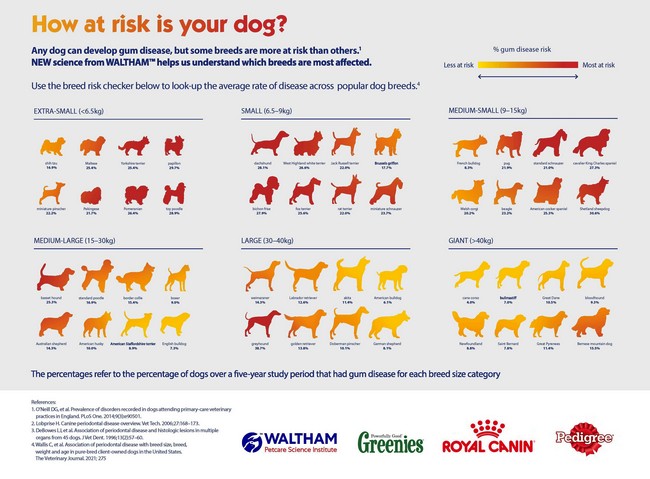The largest study of its kind analysed over 3 million dog medical records from BANFIELD™ Pet Hospital across 60 popular dog breeds across the United States.
When reviewing the data by dog size, researchers found that extra-small breeds (<6.5 kg/14.3 lbs) were up to five times more likely to be diagnosed with periodontal disease than giant breeds (>25 kg/55 lbs). Other risk factors for periodontal disease included a dog's age, being overweight and time since last scale and polish.
'Regardless of the reasons that smaller dogs have increased risk for periodontal disease, knowing the true magnitude of the risk across breeds is an important step in providing quality care for all dogs, both in the veterinarian's office and at home,' stated Dr Corrin Wallis, Microbiome Workstream Leader, Waltham Petcare Science Institute, and co-author of the study.
An underdiagnosed health issue
{{editor}}
When left untreated, periodontal disease (gum disease) in dogs can lead to pain, tooth loss, and other serious health complications. Despite it being one of the more commonly diagnosed issues by veterinarians, many dogs go undiagnosed. The retrospective study used advanced statistical methods to determine that the overall prevalence of periodontal disease in dogs was 18.2%. Although the true prevalence of periodontal disease (44-100% of cases) is only realised through in-depth clinical investigation, the figure reported in this study was consistent with other research based on predominantly conscious visual oral examinations.
This isn't the first time research has shown an association between dog breed size and periodontal disease onset; two other Waltham studies, published in the BMC Veterinary Journal, found that periodontal disease progression is accelerated in smaller dog breeds like miniature schnauzers and Yorkshire terriers. However, this study - the largest of its kind - alongside our oral microbiome research can help veterinarians and owners reduce prevalence and enable more tailored and preventative care for pets.

A good oral health routine to keep your pet's teeth healthy
Dental disease in pets develops gradually and may be reversed if caught and treated early on. Preventing it, however, is better than any treatment. Check out our pet dental health guide for our experts' tips.
by Witham pet care Sciences
You could be interested: Dog Food Toppers: What Are They and When Should They Be Used?






































